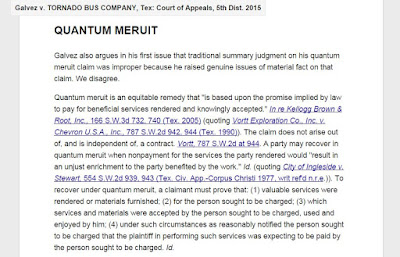IS QUANTUM MERUIT A VALID LEGAL THEORY IN A DEBT SUITS SEEKING A JUDGMENT FOR A CREDIT CARD DEBT?
Quantum meruit is an
equitable theory that allows someone who has furnished valuable materials or
services without a contract to sue the recipient who did not pay for them.
The definitional elements in
the applicable case law clearly require provision of goods or services.
But that has not stopped credit card debt plaintiffs from invoking this theory as an alternative to breach of contract. One court of appeals, oddly, even agreed, and went against the weight of established precedent.
But that has not stopped credit card debt plaintiffs from invoking this theory as an alternative to breach of contract. One court of appeals, oddly, even agreed, and went against the weight of established precedent.
But the services that credit
card companies provide are financial in nature, and the compensation they
receive for these services are (1) discount fees paid by the merchants (usually
indirectly); and (2) interest paid by cardholders who carry a balance. Interest however, is compensation for the use
of money, and not considered a payment for a service. The cardholder can
typically even avoid interest charges altogether by paying the full balance
each month, rather than merely the minimum payment amount. Additionally, the
charging of interest has its own regulatory framework, which, at the state
level, is found in the Texas Finance Code. Even if the “financial service” is
deemed a compensable service, the only charges for account administration would
be annual or monthly “membership” or “service” fees that accrue whether or not
the card is actually used, and whether or not the account has a revolving
balance. And most credit card issuers do
not even assess them, or routinely waive them if the underlying cardmember provides
for such fees.
Most importantly, however, a
quantum meruit claim is only viable if there is no contract. And credit card
accounts are always based on a contract because the business of banking is
highly regulated by state and federal governments, and a contract (i.e. express
written statement of the terms of credit to the consumer) is a regulatory
requirement at both the federal and state level.
DEFENSES TO QUANTUM MERUIT CLAIM BY DEBT COLLECTORS
SUING ON CREDIT CARD DEBT
The Truth in
Lending Act (TILA) requires written contract terms. When a credit card issuer
(or its assignee) sues, the claim necessarily involves an underlying contract
(whether in evidence or not), and the existence of a contract bars recovery
under quantum meruit.
A quantum meruit claim
requires, at a minimum, that the claimant have furnished valuable materials or
services to the party from whom it is seeking recovery. Credit card issuers do
not sell goods; nor did they provide
services that meet the definition of quantum meruit under longstanding appellate precedents.
THE CARDMEMBER/ACCOUNT
AGREEMENT GOVERNS THE RELATIONSHIP BETWEEN BANK AND CUSTOMER
In general, a party may
recover under the doctrine of quantum meruit only in the absence of an express
contract covering the services or materials furnished. The existence of an
express contract does not preclude recovery in quantum meruit for the
reasonable value of services rendered and accepted which are not covered by the
contract, but this exception has no application in the context of credit cards,
-- at least not credit cards issued by banks which have no business dealings
with their customers that would not be based on, and governed by, the
applicable account agreement.
EXCERPT FROM LEADING APPELLATE CASE:
[B]ecause Citibank proved the existence of an express
contract, Citibank cannot recover under the theory of quantum meruit.
"Quantum meruit is an equitable theory of recovery which is based on an
implied agreement to pay for benefits received." Heldenfels Bros., Inc. v.
City of Corpus Christi, 832 S.W.2d 39, 41 (Tex.1992). The doctrine of quantum
meruit requires the plaintiff to establish: "1) valuable services and/or
materials were furnished, 2) to the party sought to be charged, 3) which were
accepted by the party sought to be charged, and 4) under such circumstances as
reasonably notified the recipient that the plaintiff, in performing, expected
to be paid by the recipient." Id. However, the summary judgment evidence
establishes the existence of a contract between the parties. In general,
recovery under quantum meruit is limited to only when there is no express
contract covering the services or materials furnished. Vortt Exploration Co. v.
Chevron U.S.A., Inc., 787 S.W.2d 942, 944 (Tex.1990); Academy Corp. v. Interior
Buildout & Turnkey Constr., Inc., 21 S.W.3d 732, 741 (Tex.App.-Houston
[14th Dist.] 2000, no pet.). Because the summary judgment evidence established
the existence of a contract as a matter of law, Citibank cannot recover under
the theory of quantum meruit. 
No comments:
Post a Comment